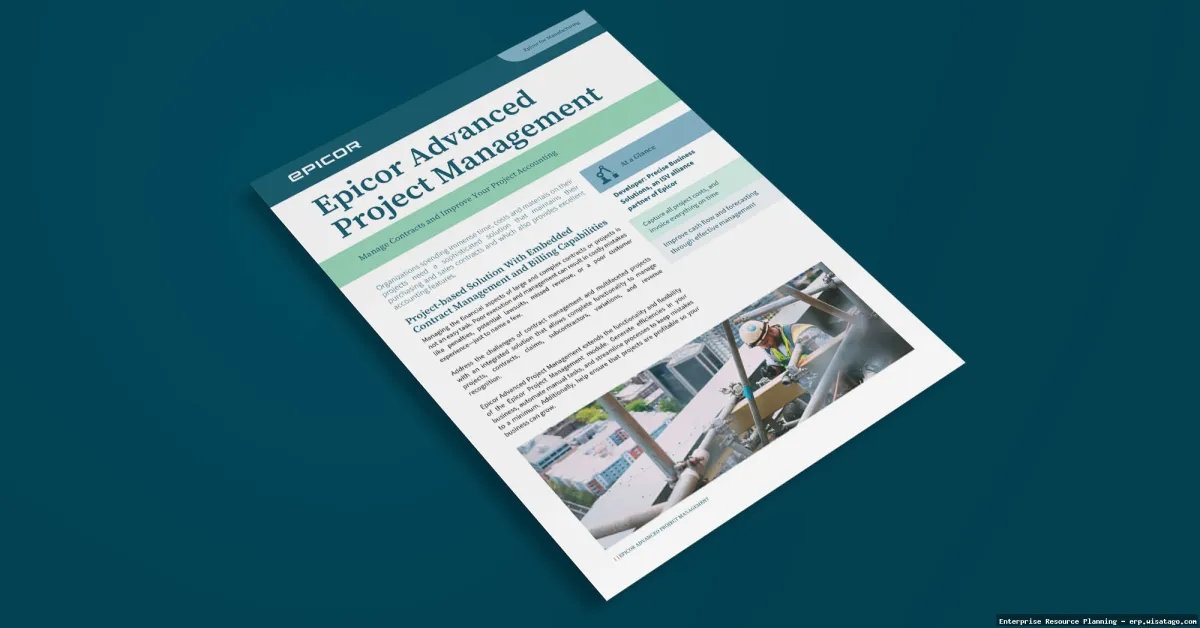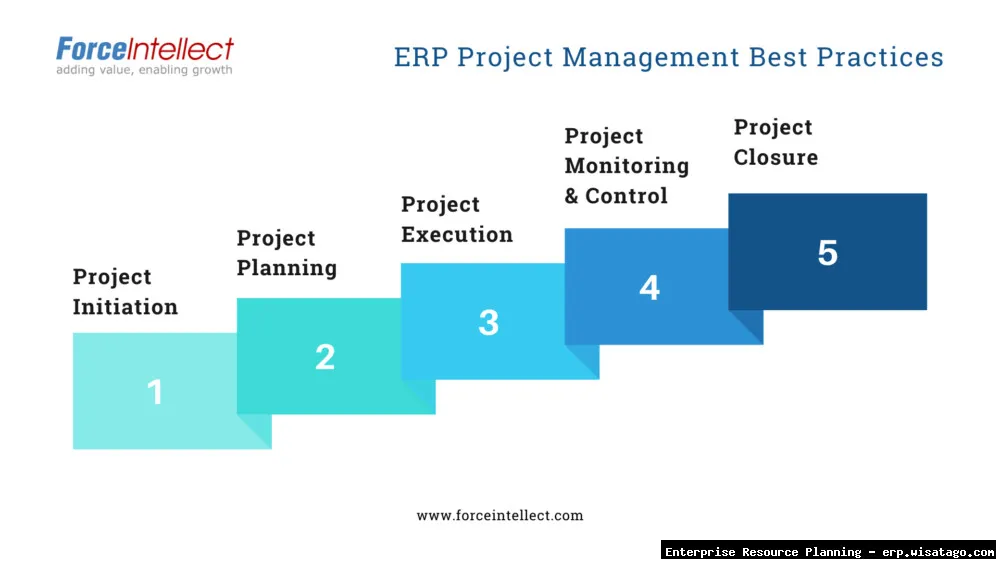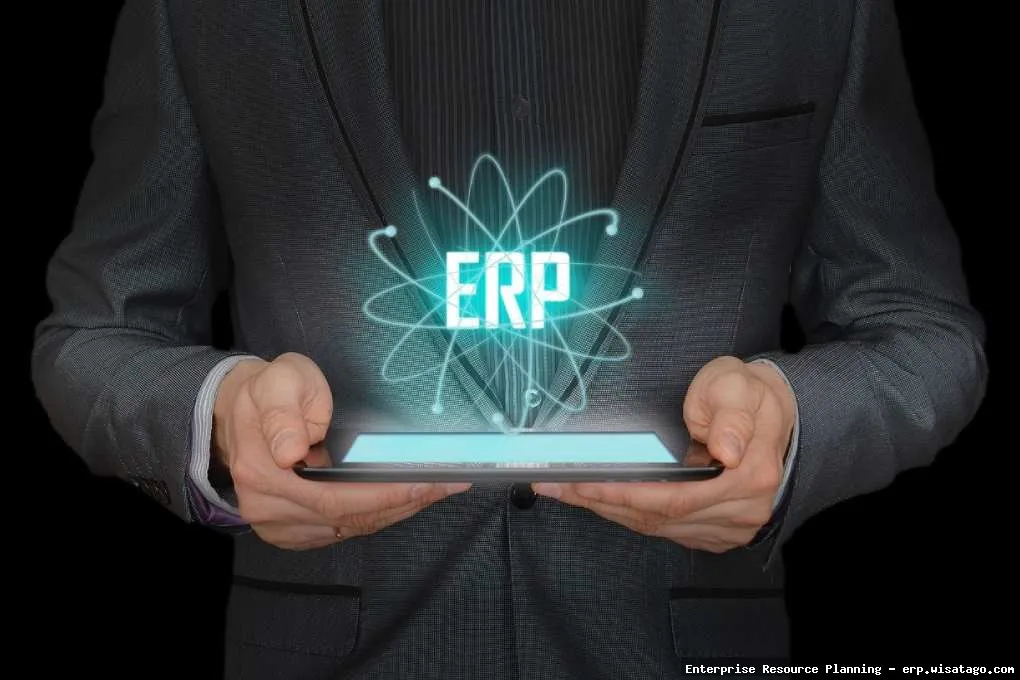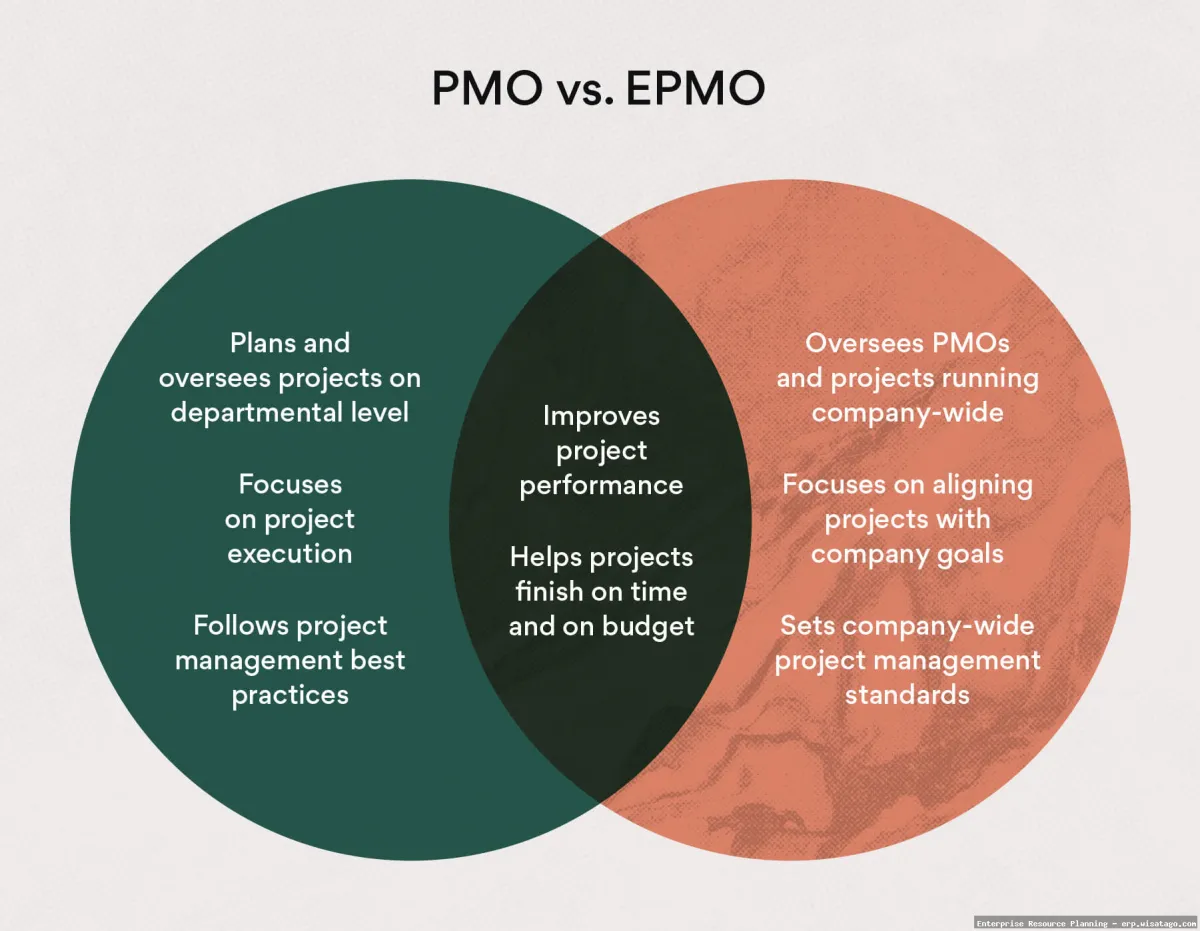In today’s fast-paced business environment, organizations are constantly seeking ways to streamline operations, improve efficiency, and gain a competitive edge. Enterprise Resource Planning (ERP) systems have emerged as a cornerstone for achieving these goals, offering a centralized platform to manage various business processes. However, for project-driven organizations, a standard ERP system often falls short in providing the robust project management capabilities needed to effectively plan, execute, and control projects. This is where the integration of advanced project management functionalities within an ERP system becomes crucial.
Think of an ERP system as the central nervous system of your business. It connects all the different parts – finance, HR, supply chain, manufacturing – allowing information to flow seamlessly. But if your business revolves around projects, like construction, engineering, or even marketing agencies, you need more than just a central nervous system. You need a highly specialized project management module that integrates directly into that system. This integration isn’t just about adding features; it’s about creating a unified platform that eliminates data silos, improves collaboration, and provides real-time visibility into project performance.

This article aims to provide a comprehensive guide to enterprise ERP systems with advanced project management capabilities. We’ll explore the key features, benefits, and considerations for implementing such a system, drawing from real-world experiences and lessons learned. Whether you’re a seasoned project manager or a business leader considering an ERP upgrade, this guide will equip you with the knowledge to make informed decisions and unlock the full potential of your organization’s project management capabilities.
Understanding Enterprise ERP
Enterprise Resource Planning (ERP) is a type of software system that helps organizations automate and manage core business processes for optimal performance. These processes often include, but are not limited to:. To streamline business processes and gain a competitive edge, companies often seek Advanced Erp Solutions to optimize their operations
- Finance: General ledger, accounts payable, accounts receivable, budgeting, and financial reporting.
- Human Resources: Payroll, benefits administration, talent management, and time tracking.
- Supply Chain Management: Inventory management, procurement, order management, and logistics.
- Manufacturing: Production planning, shop floor control, quality management, and materials management.
- Customer Relationship Management (CRM): Sales, marketing, and customer service.
The primary goal of an ERP system is to integrate these functions into a single, unified database. This integration eliminates data silos, reduces manual data entry, and provides a holistic view of the organization’s operations. By centralizing information, ERP systems enable better decision-making, improved efficiency, and enhanced collaboration across departments.
Benefits of ERP Systems
Implementing an ERP system can bring numerous benefits to an organization, including:
- Improved Efficiency: Automating tasks and streamlining processes reduces manual effort and improves overall efficiency.
- Better Decision-Making: Real-time data and comprehensive reporting provide insights that enable informed decision-making.
- Enhanced Collaboration: A centralized platform facilitates communication and collaboration across departments.
- Reduced Costs: Optimizing resource allocation and eliminating redundancies can lead to significant cost savings.
- Increased Visibility: A holistic view of the organization’s operations provides greater transparency and control.
- Improved Compliance: Automated processes and audit trails help ensure compliance with regulatory requirements.
The Need for Advanced Project Management in ERP
While standard ERP systems offer basic project management functionalities, they often lack the advanced capabilities required by project-driven organizations. These limitations can lead to:
- Inefficient Project Planning: Lack of robust planning tools can result in unrealistic schedules and resource allocation.
- Poor Resource Management: Difficulty in tracking resource availability and utilization can lead to over- or under-allocation of resources.
- Inadequate Cost Control: Inaccurate cost tracking and forecasting can result in budget overruns.
- Limited Collaboration: Lack of a centralized platform for project communication and collaboration can hinder team performance.
- Insufficient Reporting: Inadequate project reporting can make it difficult to monitor progress and identify potential issues.
For organizations that rely heavily on projects, integrating advanced project management capabilities within their ERP system is essential for overcoming these limitations and achieving project success. This integration provides a unified platform for managing all aspects of the project lifecycle, from planning and execution to monitoring and control.
Key Features of Advanced Project Management in ERP
Advanced project management modules within an ERP system offer a wide range of features designed to streamline project operations and improve project outcomes. Some of the key features include:

. Many businesses find they need to integrate previously disparate systems, ERP becoming a central point for managing core operations
.
Project Planning and Scheduling
This feature allows project managers to create detailed project plans, define tasks and dependencies, and allocate resources to specific activities. Advanced scheduling tools, such as Gantt charts and critical path analysis, help optimize project timelines and identify potential bottlenecks.
Resource Management
Resource management capabilities enable project managers to track resource availability, allocate resources to projects based on skills and availability, and monitor resource utilization. This ensures that resources are used efficiently and that projects are adequately staffed.
Cost Management
Cost management features allow project managers to track project costs, forecast future costs, and monitor budget performance. Integration with the ERP‘s financial module provides real-time visibility into project financials and enables accurate cost accounting.
Risk Management
Risk management tools help project managers identify, assess, and mitigate potential risks that could impact project success. This includes creating risk registers, developing mitigation plans, and tracking risk status throughout the project lifecycle.
Collaboration and Communication
Collaboration features provide a centralized platform for project communication, document sharing, and task management. This facilitates seamless collaboration among project team members and stakeholders, regardless of their location.
Reporting and Analytics
Robust reporting and analytics capabilities provide insights into project performance, resource utilization, and cost trends. Customizable dashboards and reports enable project managers to monitor key performance indicators (KPIs) and identify areas for improvement.
Integration with Other ERP Modules
Seamless integration with other ERP modules, such as finance, HR, and supply chain, is crucial for ensuring data consistency and eliminating data silos. This integration enables a holistic view of the organization’s operations and facilitates informed decision-making.

Benefits of Integrating Advanced Project Management with ERP
The integration of advanced project management capabilities within an ERP system offers numerous benefits to project-driven organizations:
- Improved Project Performance: Streamlined processes, better resource allocation, and enhanced collaboration lead to improved project outcomes.
- Reduced Project Costs: Accurate cost tracking, forecasting, and control help minimize budget overruns and maximize profitability.
- Enhanced Resource Utilization: Efficient resource management ensures that resources are used effectively and that projects are adequately staffed.
- Better Decision-Making: Real-time data and comprehensive reporting provide insights that enable informed decision-making.
- Increased Visibility: A holistic view of project operations provides greater transparency and control.
- Improved Stakeholder Satisfaction: Successful project delivery and effective communication enhance stakeholder satisfaction.
Choosing the Right ERP with Advanced Project Management
Selecting the right ERP system with advanced project management capabilities is a critical decision that can significantly impact an organization’s success. Here are some key considerations:
Assess Your Business Needs
Start by clearly defining your organization’s specific project management requirements. Consider the types of projects you manage, the size of your project teams, the complexity of your projects, and the level of integration you need with other ERP modules. This assessment will help you identify the key features and functionalities you need in an ERP system.
Evaluate Different ERP Solutions
Research and evaluate different ERP solutions that offer advanced project management capabilities. Consider factors such as:
- Functionality: Does the system offer the features and functionalities you need to manage your projects effectively?
- Integration: How well does the system integrate with other ERP modules and third-party applications?
- Scalability: Can the system scale to meet your organization’s growing needs?
- Usability: Is the system user-friendly and easy to learn?
- Cost: What is the total cost of ownership, including implementation, maintenance, and support?
- Vendor Reputation: Does the vendor have a good reputation and a proven track record of success?
Consider Cloud vs. On-Premise Deployment
Decide whether you prefer a cloud-based or on-premise deployment. Cloud-based ERP systems offer benefits such as lower upfront costs, easier maintenance, and greater scalability. On-premise systems provide greater control over data and infrastructure, but require more IT resources to manage.
Request a Demo and Pilot Project
Before making a final decision, request a demo of the ERP system and consider running a pilot project to test its functionality and integration with your existing systems. This will give you a better understanding of how the system works and whether it meets your organization’s needs.
Get User Feedback
Gather feedback from potential users throughout the evaluation process. Their input is crucial for ensuring that the chosen system meets their needs and is easy to use.

Common Challenges and How to Overcome Them
Implementing an ERP system with advanced project management can be a complex undertaking, and organizations may face several challenges along the way. Here are some common challenges and how to overcome them:
Resistance to Change
Employees may resist adopting a new system, especially if it requires them to change their work processes. To overcome this resistance, communicate the benefits of the new system clearly, provide adequate training, and involve employees in the implementation process.
Data Migration
Migrating data from legacy systems to the new ERP system can be a time-consuming and error-prone process. To ensure a smooth data migration, plan carefully, cleanse and validate data before migrating it, and use data migration tools to automate the process.
Integration Issues
Integrating the ERP system with other systems can be challenging, especially if the systems use different technologies or data formats. To address integration issues, use standard integration protocols, conduct thorough testing, and work closely with the ERP vendor to resolve any problems.
Lack of Training
Insufficient training can lead to user errors and underutilization of the ERP system. Provide comprehensive training to all users, including hands-on exercises and real-world scenarios. Offer ongoing support and training to ensure that users are comfortable using the system.
Scope Creep
Scope creep can lead to project delays and budget overruns. To manage scope creep, define the project scope clearly at the outset, establish a change management process, and carefully evaluate all change requests.
Conclusion
Enterprise ERP systems with advanced project management offer a powerful solution for organizations seeking to streamline project operations, improve efficiency, and gain a competitive edge. By integrating project management capabilities within a centralized ERP platform, businesses can eliminate data silos, enhance collaboration, and gain real-time visibility into project performance. While implementing such a system can be challenging, the benefits of improved project outcomes, reduced costs, and enhanced resource utilization make it a worthwhile investment.

Remember that the key to successful implementation lies in careful planning, thorough evaluation of different solutions, and a strong commitment to change management. By taking the time to assess your organization’s needs, evaluate different ERP systems, and address potential challenges, you can unlock the full potential of your project management capabilities and achieve lasting business success. Don’t hesitate to consult with ERP implementation experts to guide you through the process and ensure a smooth transition.
Ultimately, the right ERP with advanced project management isn’t just about software; it’s about transforming how your organization operates and delivers value to your customers. It’s about empowering your teams with the tools they need to succeed and driving sustainable growth for your business.
Conclusion
In conclusion, the integration of advanced project management capabilities within an Enterprise ERP system offers a transformative approach to organizational efficiency and strategic execution. By centralizing data, streamlining workflows, and providing real-time visibility across all facets of the business, companies can overcome traditional silos and unlock significant improvements in project success rates, resource utilization, and overall profitability. The synergy between ERP‘s core functionalities and sophisticated project management tools empowers businesses to not only manage their day-to-day operations effectively but also to proactively plan, execute, and monitor complex projects with greater agility and control.
Ultimately, the adoption of an Enterprise ERP with advanced project management is an investment in future growth and competitiveness. We’ve explored the key benefits and considerations in this article, highlighting the potential for enhanced collaboration, data-driven decision-making, and improved project outcomes. If you’re ready to explore how this integrated solution can revolutionize your organization’s project management capabilities and drive tangible business value, we encourage you to contact our team for a personalized consultation and discover how we can tailor an ERP solution to meet your specific needs.
Frequently Asked Questions (FAQ) about Enterprise ERP with Advanced Project Management
How does integrating advanced project management capabilities within an enterprise ERP system improve overall business efficiency and project success rates?
Integrating advanced project management into your enterprise ERP system significantly boosts business efficiency by streamlining workflows and improving resource allocation. By connecting project data directly with financial, supply chain, and HR information, you gain real-time visibility into project costs, timelines, and resource utilization. This eliminates data silos, reduces manual data entry, and minimizes errors. Moreover, features like risk management, task dependencies, and critical path analysis enable proactive issue identification and resolution, leading to higher project success rates. The improved collaboration and communication fostered by a centralized system also contribute to increased productivity and better informed decision-making, ultimately driving profitability and competitive advantage.
What are the key features to look for when choosing an ERP system with project management, specifically considering resource planning, budget control, and progress tracking for complex projects?
When selecting an ERP system with project management, prioritize key features that address resource planning, budget control, and progress tracking. Look for robust resource allocation tools that allow you to assign personnel, equipment, and materials to projects based on availability and skills. Effective budget control requires features like cost estimation, budget tracking, variance analysis, and real-time financial reporting tied directly to project activities. For progress tracking, the system should offer Gantt charts, task dependencies, milestone management, and customizable dashboards that provide a clear overview of project status. Integration with other ERP modules like accounting and supply chain is crucial for accurate cost management and streamlined procurement processes. Consider systems offering strong reporting and analytics capabilities, enabling you to identify trends, optimize resource utilization, and improve future project performance.
How can an enterprise ERP with advanced project management help in managing project risks and ensuring compliance with industry regulations across different departments within a company?
An enterprise ERP with advanced project management capabilities provides a centralized platform to proactively manage project risks and ensure compliance. The system should incorporate risk assessment tools that allow you to identify potential threats, assess their impact, and develop mitigation strategies. These risks can be documented, assigned to responsible parties, and tracked throughout the project lifecycle. For compliance, the ERP system facilitates adherence to industry regulations by providing audit trails, document management, and workflow automation. It ensures that all project activities, from procurement to quality control, are performed according to established procedures and standards. This centralized approach reduces the risk of non-compliance, improves transparency, and simplifies audits across different departments. Furthermore, features like version control and electronic signatures ensure the integrity and authenticity of project documentation.
